|
Featured picture tools: |
These featured pictures, as scheduled below, appeared as the picture of the day (POTD) on the English Wikipedia's Main Page in August 2011. Individual sections for each day on this page can be linked to with the day number as the anchor name (e.g. [[Wikipedia:Picture of the day/August 2011#1]] for August 1).
You can add an automatically updating POTD template to your user page using {{Pic of the day}} (version with blurb) or {{POTD}} (version without blurb). For instructions on how to make custom POTD layouts, see Wikipedia:Picture of the day.Purge server cache
August 1
|
A 360° panorama of a portion of the Namib Desert with the Spitzkoppe (centre), a group of bald granite peaks or bornhardts, and the Pontok Mountains (centre-right) in the distance. The highest peak in the Spitzkoppe rises about 700 m (2,300 ft) above the desert floor, to a total of 1,784 m (5,853 ft) above mean sea level. Until modern times, climbing the peak presented a formidable challenge, owing to its isolation, the heat of the desert and the total lack of water. Photo: Ikiwaner
Recently featured:
|
August 2

|
A Russet potato and the cross-section of another. Potatoes are the world's fourth-largest food crop. They originated in the area of present-day southern Peru and were domesticated 7,000–10,000 years ago. The Russet is the most commonly grown cultivar in the United States and Canada. Photo: ZooFari
Recently featured:
|
August 3
|
A panoramic view of Lake Pedder in South West Tasmania, the largest freshwater lake in Australia, as seen from Mount Eliza in Southwest National Park. The lake is actually an impoundment created by three separate dams built to generate hydro-electricity, incorporating a previous, smaller lake with the same name. It is named after John Pedder, the first Chief Justice of Tasmania. Photo: JJ Harrison
Recently featured:
|
August 4

|
An illustration depicting an ancient Mexican calendar. The Maya and Aztec calendars are the most familiar of the Mexican calendars, but similar ones were used by other cultures. Common to all Mesoamerican cultures was the 260-day ritual calendar that had no confirmed correlation to astronomical or agricultural cycles. These were used in combination with a separate 365-day calendar to create a 52-year cycle known as a calendar round. Artist: A. de Leon y Gama; Restoration: Garrondo/Lise Broer
Recently featured:
|
August 5

|
A female Siberian tiger (Panthera tigris altaica), a subspecies of tiger native to Central Asia, and her cub. The Siberian tiger is the largest of the extant tiger subspecies as well as the largest felid, attaining 320 kg (710 lb) in an exceptional specimen. Considered an endangered subspecies, the wild population is down to several hundred individuals and is limited to eastern Siberia. Photo: Dave Pape
Recently featured:
|
August 6

|
A male mosquito (species unidentified), one of over 1,200 species from the genus Culex, in the Kilimanjaro Region of Tanzania. Several Culex species serve as vectors of important diseases, such as West Nile virus, filariasis, Japanese encephalitis, St. Louis encephalitis and avian malaria. Photo: Muhammad Mahdi Karim
Recently featured:
|
August 7

|
A photochrom print of the General Art and Industrial Exposition of Stockholm complex on the island of Djurgården, located in central Stockholm, Sweden. Several of the structures built for the 1897 World's Fair still remain on the western part of the island, including Djurgårdsbron, the main bridge to the island; the Skansens Bergbana, the funicular railway now in the Skansen open air museum and zoo; and the Nordic Museum. Photochrom: Photoglob Zürich; Restoration: Lise Broer
Recently featured:
|
August 8

|
The flower of a Mountain Rocket plant (Bellendena montana), the sole member of the Bellendena genus, which in turn is the sole member of the subfamily Bellendenoideae. It is endemic to high-altitude parts of Tasmania, Australia, but is not often cultivated because it is difficult to grow at low altitudes. Photo: JJ Harrison
Recently featured:
|
August 9

|
Roald Amundsen at the wheel of Maud in 1920, during his unsuccessful attempt to cross the Northeast Passage and reach the North Pole. Although Amundsen did indeed successfully journey eastward along the coast of Siberia to Nome, Alaska, his plan of freezing the ship in the polar ice pack and letting it drift northward did not work as the currents were uncooperative. Amundsen finally did fly over the North Pole in 1926 in the airship Norge, making him the first person to attain both North and South Poles. Photo: Lomen Brothers; Restoration: Lise Broer
Recently featured:
|
August 10
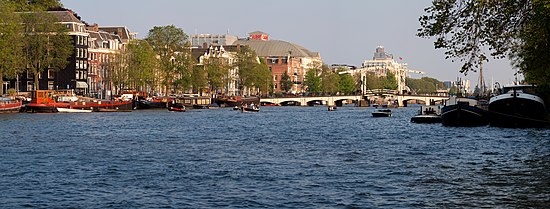
|
|
The river Amstel, flowing through the centre of Amsterdam. Visible are some of the city's most important landmarks located adjacent to the river in this panorama, such as the Magere Brug (crossing the river), the Koninklijk Theater Carré, Amstel Hotel and Rembrandt Tower. Photo: Massimo Catarinella
Recently featured:
|
August 11

|
The Salar de Talar salt flat, located in the Central Andean dry puna region of the Chilean Andes with Cerros de Incahuasi in the distance. The salt flat covers an area of about 46 km2 (18 sq mi) and is one of many salt lakes and salt flats located at the foothills of a chain of volcanoes stretching along the eastern side of the much greater Salar de Atacama. Photo: Luca Galuzzi
Recently featured:
|
August 12

|
A Kuna woman selling molas, a textile art form used to make the clothing typically worn by Kuna women. The Kuna are an indigenous people of Panama and Colombia, with a total population of about 50,000. The greatest number of Kuna people live on small islands in the comarca of Kuna Yala. Photo: Markus Leupold-Löwenthal
Recently featured:
|
August 13

|
An aerial view of destroyed homes in Punta Gorda, Florida, following Hurricane Charley, which made landfall in Florida on August 13, 2004, while at its maximum intensity. It was the strongest hurricane to strike the United States since Hurricane Andrew in 1992 (Hurricane Katrina was deadlier, but it had weakened by the time it reached Louisiana). Photo: Andrea Booher, FEMA
Recently featured:
|
August 14

|
A male Splendid Fairywren (Malurus splendens), a passerine bird found throughout much of Australia. This individual is engaged in the 'face fan' courtship display, in which he flares his blue ear tufts by erecting the feathers. The species exhibits a high degree of sexual dimorphism: males in breeding plumage are brightly coloured, whereas non-breeding males, females and juveniles are predominantly grey-brown; this gave the early impression that males were polygamous as all dull-coloured birds were taken for females. Photo: Nevil Lazarus
Recently featured:
|
August 15
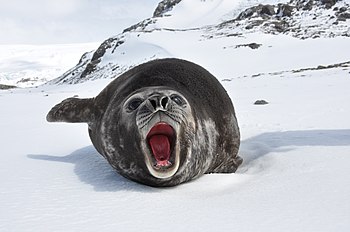
|
Close-up of a juvenile Southern Elephant Seal (Mirounga leonina), showing face and mouth detail. This species of elephant seal is not only the most massive pinniped, but also the largest member of the order Carnivora living today. It is found throughout the subantarctic region. Photo: Serge Ouachée
Recently featured:
|
August 16

|
A sprig from a Kānuka (Kunzea ericoides), a tree native to Australia and New Zealand. It can grow to a height of 30 m (98 ft), and with its small but abundant flowers, it can colour a whole hillside white, almost giving the appearance of snow cover. It is widespread particularly in coastal scrub, and may also be found colonizing land recovering after a fire or reverting to a natural state after being used for agriculture. Photo: Benjamint444
Recently featured:
|
August 17

|
The Hohenzollern Bridge crossing the Rhine in Cologne, Germany, with the Cologne Cathedral in the background. The bridge is a tied-arch railway bridge, as well as a pedestrian bridge. Originally built in 1911, it survived numerous Allied bombings in World War II, only to be destroyed by German engineers as the war drew to a close. Reconstruction began soon after and the bridge was opened to pedestrian traffic in 1948 and completely opened in 1959. Photo: Thomas Wolf
Recently featured:
|
August 18
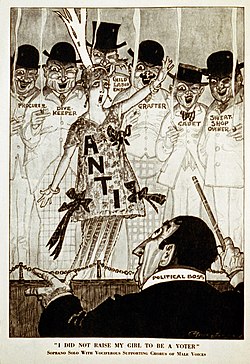
|
"I did not raise my girl to be a voter": A 1915 parody from Puck of the anti-World War I protest song "I Didn't Raise My Boy to Be a Soldier" with the context altered to women's suffrage. A conductor labeled "political boss" leads a lone female soloist surrounded by a male chorus with various labels including "procurer", "child labor employer", and "sweat shop owner". Arguments in favor of granting women the right to vote included the contention that female voters would support laws that reduced prostitution, labor abuses, and other perceived social evils. The fight for women's suffrage in the United States began in the 1830s, and concluded with the passage of the Nineteenth Amendment to the United States Constitution on August 18, 1920. Cartoon: Merle De Vore Johnson; Restoration: Adam Cuerden
Recently featured:
|
August 19

|
Meat ants (Iridomyrmex purpureus) eating a cicada. Found throughout Australia, meat ants are omnivorous scavengers that get their name from their use, by farmers, to remove carcasses. However, the main portion of their diet comes from honeydew secreted by hemipterous insects—they even maintain mutualistic relationships with certain species of leafhoppers and caterpillars. Photo: John O'Neill
Recently featured:
|
August 20
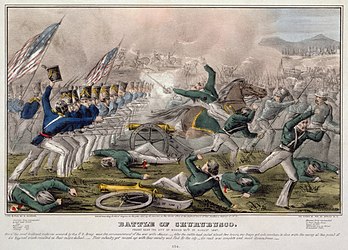
|
The Battle of Churubusco took place on August 20, 1847, in Churubusco (now a suburb of Mexico City) during the Mexican–American War. Three Mexican battalions—including the Saint Patrick's Battalion made up of immigrants—took up defensive positions inside a convent and were able to repulse the American attacks until they ran out of ammunition. Artist: John Cameron; Restoration: Lise Broer
Recently featured:
|
August 21

|
This true-color satellite view of the Hawaiian Islands shows that most of the vegetation on the islands grows on the northeast sides which face the trade winds. The silver glow around the calmer southwest sides is the result of the shelter provided from the islands. Hawaii's mountains, the ocean current, and water temperature combine to create a "wind wake" that extends for 3,000 kilometres (1,900 mi) to the southwest—ten times longer than any other. Photo: Jacques Descloitres, MODIS team at NASA
Recently featured:
|
August 22

|
A female koala (Phascolarctos cinereus) with her joey clinging to her back. At birth the joey is hairless, blind, and earless, and only about 20 mm (0.79 in) long. It remains hidden in the pouch for about six months, feeding only on milk. During this time it will grow ears, eyes, and fur. The joey will remain with its mother for another six months or so, riding on her back, and feeding on both milk and eucalypt leaves until weaning is complete at about 12 months of age. Photo: Benjamint444
Recently featured:
|
August 23
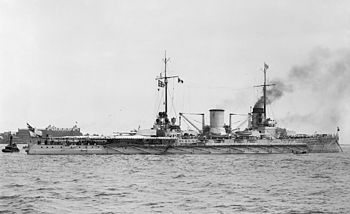
|
The SMS Moltke was the second battlecruiser commissioned into the German Imperial Navy. The ship participated in most of the major fleet actions conducted by the German Navy during World War I. In 1919, Moltke, along with most of the High Seas Fleet, was scuttled to prevent it from falling into British hands. Photo: Harris & Ewing; Restoration: Staxringold/Durova
Recently featured:
|
August 24

|
The Tawny Frogmouth (Podargus strigoides) is a nocturnal species of Australian frogmouth commonly mistaken for an owl. Males and females look similar, growing to 35–53 cm (14–21 in) long and up to 680 g (1.5 lb) in weight. The Tawny Frogmouth is almost exclusively insectivorous, feeding rarely on frogs and other small prey. It generally sits very still on a low perch and catches food with its beak. Photo: JJ Harrison
Recently featured:
|
August 25

|
Robbie McEwen, Australian professional road cyclist, wearing his Team Katusha (Russian: Катюша) cycling kit at the start of the 2010 Jayco Bay Cycling Classic. McEwen's accolades include winning the maillot vert (green jersey) overall Points Classification in the Tour de France three times, along with winning 12 individual stages, and competing in three Olympic Games. The green and gold bands around his arms identify him as an Australian National Cycling Champion. Photo: John O'Neill
Recently featured:
|
August 26

|
A view of the Golden Gate Bridge from Baker Beach, a public beach located at the northwestern end of San Francisco. It is roughly a half mile (0.8 km) long, beginning just south of the bridge, extending southward toward the Sea Cliff peninsula, the Palace of the Legion of Honor and the Sutro Baths. Photo: Christian Mehlführer
Recently featured:
|
August 27
|
A time-lapse photomontage showing multiple stages of a Monarch Airlines Airbus A320 aircraft taking off (moving right-to-left) from Gibraltar Airport, located at the northern end of Gibraltar in disputed territory. Also visible in the center is Winston Churchill Avenue, the only street joining Gibraltar to Spain. As can be seen, the road intersects the airport runway, so consequently it has to be closed every time a plane lands or departs. Photo: Michael F. Mehnert
Recently featured:
|
August 28

|
American folk singers Joan Baez and Bob Dylan, performing a duet at the March on Washington for Jobs and Freedom on August 28, 1963. Both were relatively new recording artists at the time, with Baez being at the forefront of American roots revival and Dylan having just released his second album. Baez was especially influential in introducing audiences to Dylan's music by recording several of his early songs and inviting him onstage during her own concerts. Photo: Rowland Scherman, USIA
Recently featured:
|
August 29

|
|
A poster celebrating the Pittsburgh Pirates of Major League Baseball winning the National League title in the 1909 season. Led by Honus Wagner (top right) and Fred Clarke (middle, third from left), the Pirates scored the most runs among all teams. Also shown are Frank Chance of the Chicago Cubs (bottom) and John McGraw of the New York Giants (center), two of the Pirates' rivals, being made to walk the plank. Image: C. Rollins; Restoration: Staxringold
Recently featured:
|
August 30

|
The Silky Hairstreak (Pseudalmenus chlorinda) is a butterfly species that occurs in south-eastern Australia and Tasmania. Adult males and females appear similar, with a wingspan of about 28 mm (1.1 in). Photo: JJ Harrison
Recently featured:
|
August 31

|
American actor, film director, producer and screenwriter George Clooney at the 66th Venice International Film Festival in 2009. Clooney made his acting debut on American television in 1978, but gained fame and recognition on the long-running medical drama ER from 1994 to 1999. During that time, he started attracting a variety of leading roles in films, with the 2001 film Ocean's Eleven being his biggest commercial success. He made his directorial debut a year later with Confessions of a Dangerous Mind. Clooney is also noted for his social activism and has served as one of the United Nations Messengers of Peace since January 2008. Photo: Nicolas Genin
Recently featured:
|
Picture of the day archives and future dates


